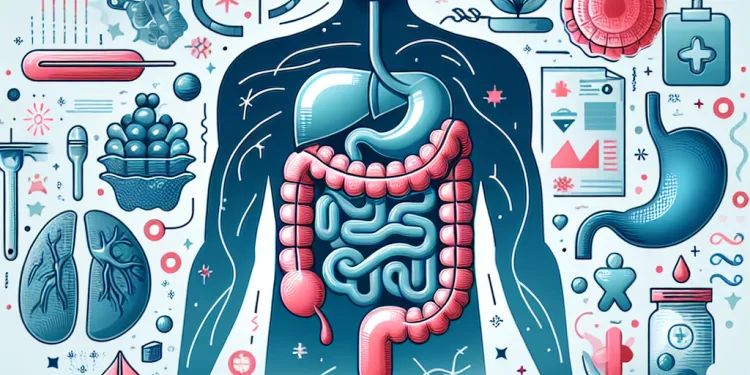
Find Help
More Items From Ergsy search
-
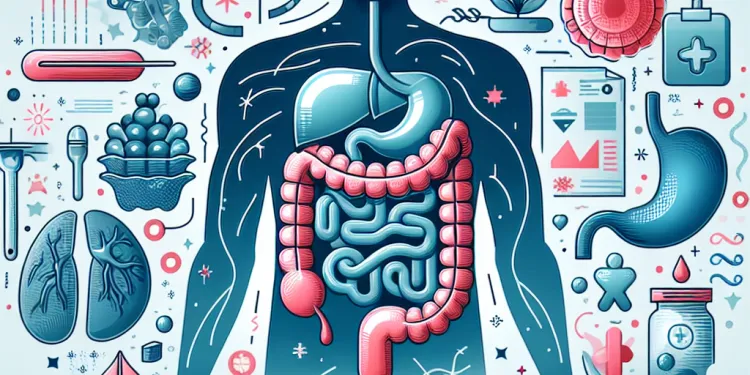
Are there any complications associated with Crohn's disease?
Relevance: 100%
-
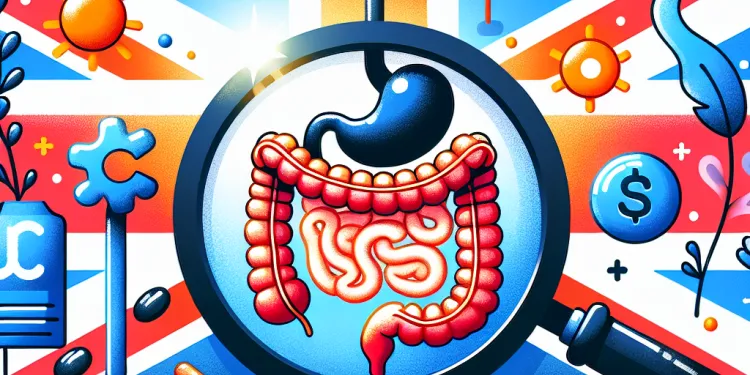
Is there a cure for Crohn's disease?
Relevance: 80%
-
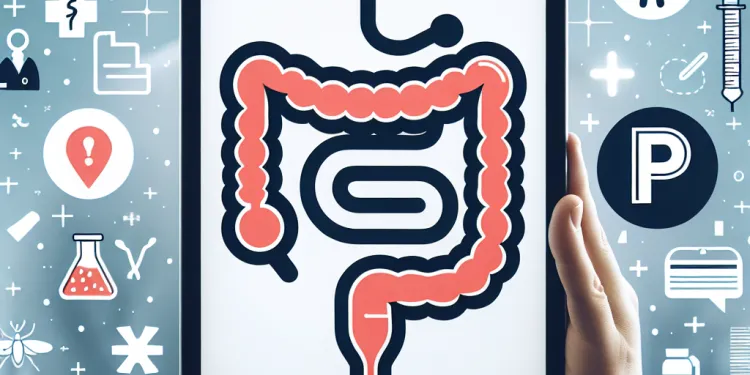
Is surgery necessary for Crohn's disease?
Relevance: 78%
-
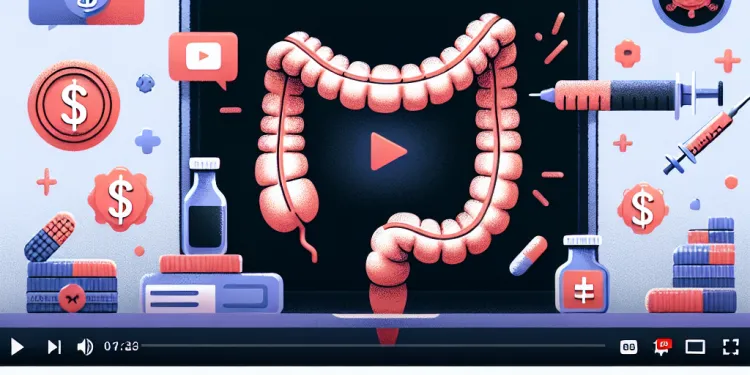
What causes Crohn's disease?
Relevance: 77%
-

Is Crohn's disease contagious?
Relevance: 77%
-
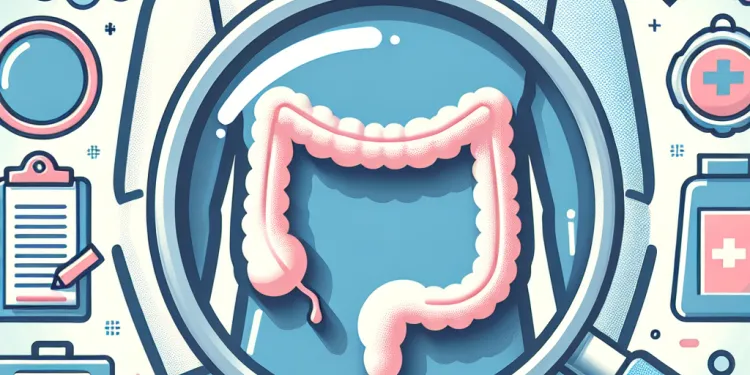
How is Crohn's disease diagnosed?
Relevance: 76%
-
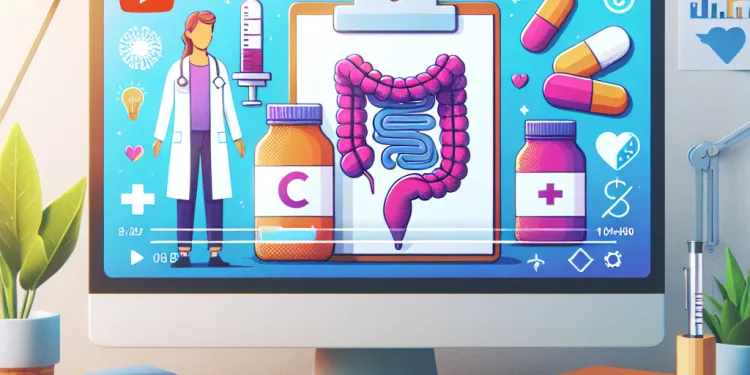
What treatments are available for Crohn's disease?
Relevance: 75%
-
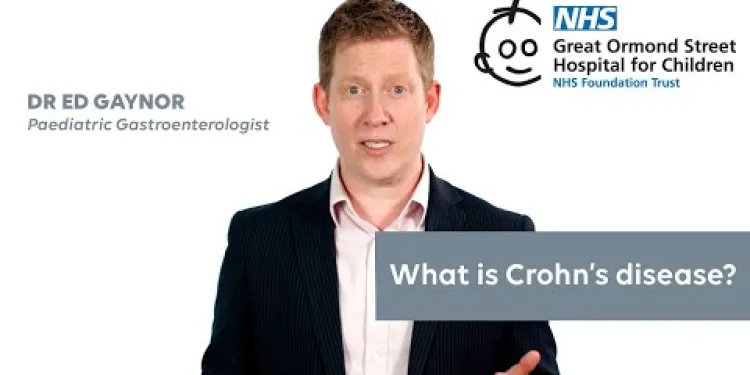
What is Crohn’s disease and how is it treated?
Relevance: 75%
-
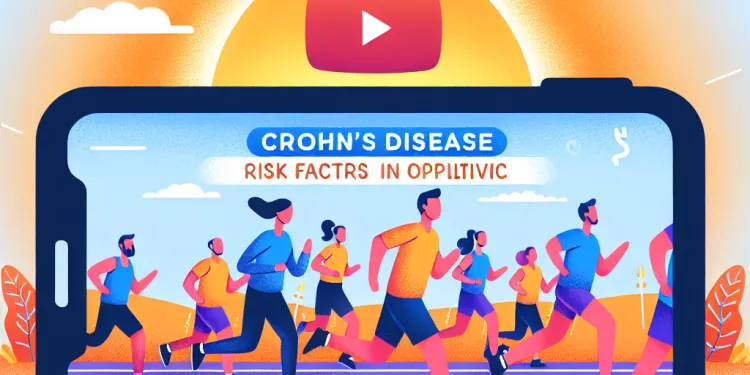
Who is at risk of developing Crohn's disease?
Relevance: 74%
-
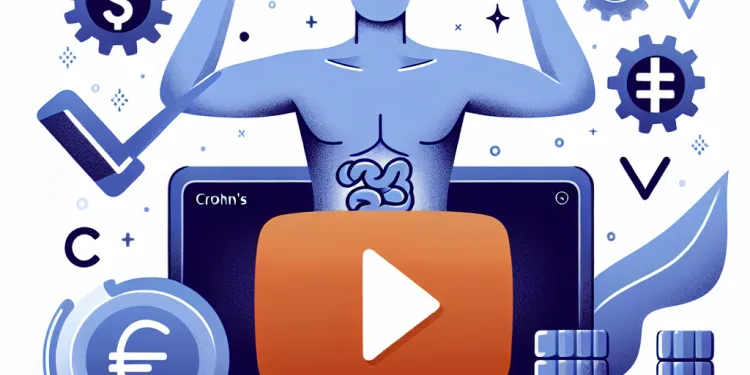
What are the common symptoms of Crohn's disease?
Relevance: 74%
-
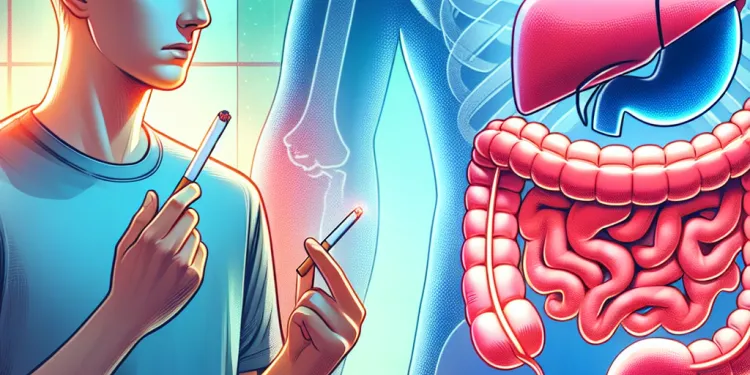
How does smoking affect Crohn's disease?
Relevance: 72%
-

Can children develop Crohn's disease?
Relevance: 71%
-

What support is available for people with Crohn's disease in the UK?
Relevance: 70%
-

What is the best diet for Crohn’s disease?
Relevance: 70%
-
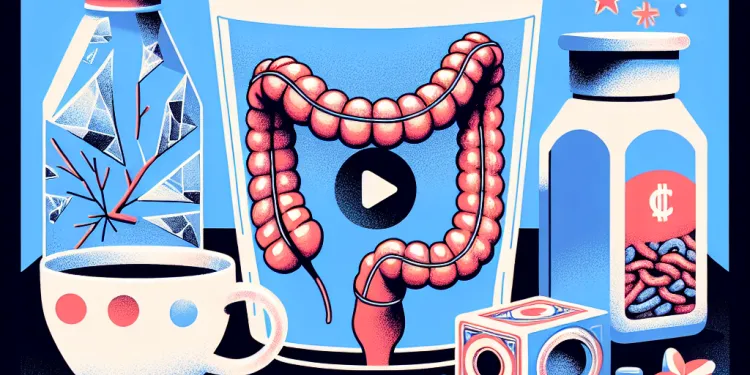
Can stress make Crohn's disease worse?
Relevance: 68%
-

What dietary changes can help manage Crohn's disease?
Relevance: 63%
-

Infliximab infusion (Remicade) for Crohns Disease at Addenbrookes NHS hospital
Relevance: 57%
-

What are the complications of sickle cell disease?
Relevance: 51%
-

Can flesh-eating disease cause long-term complications?
Relevance: 49%
-

What are the complications of chickenpox?
Relevance: 38%
-

What complications are associated with Type 2 Diabetes?
Relevance: 35%
-

Can measles cause complications?
Relevance: 35%
-
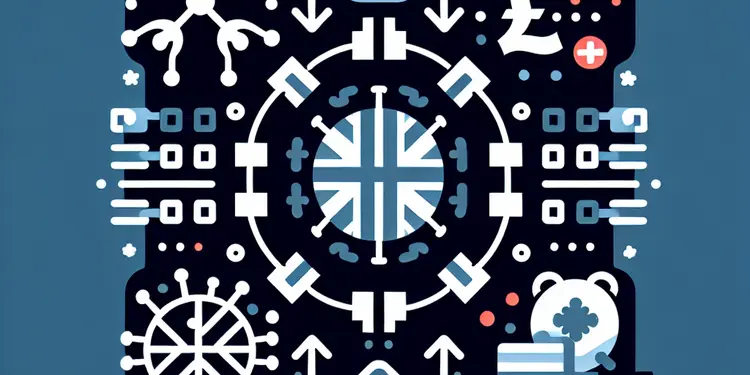
Who is most at risk for complications from H3N2?
Relevance: 34%
-
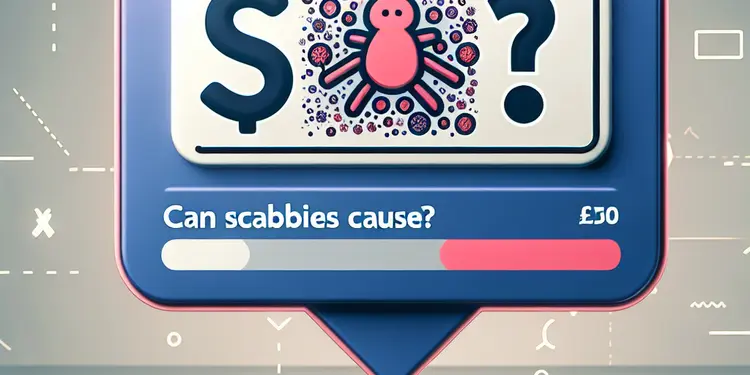
Can scabies cause complications?
Relevance: 34%
-
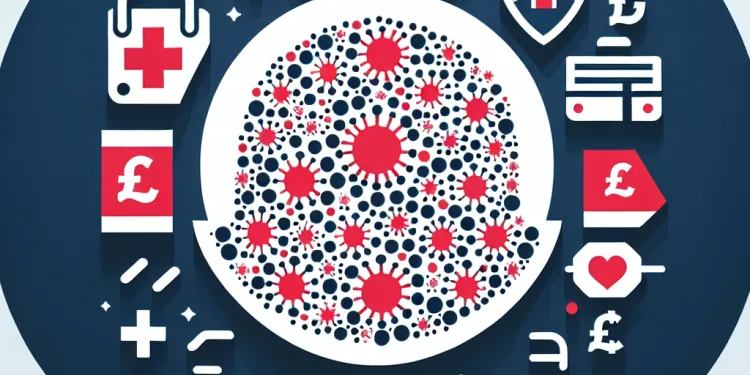
Are there any complications associated with shingles?
Relevance: 33%
-

What complications can arise from measles?
Relevance: 33%
-

Are there any complications associated with shingles?
Relevance: 33%
-

Can Nipah Virus cause neurological complications?
Relevance: 33%
-
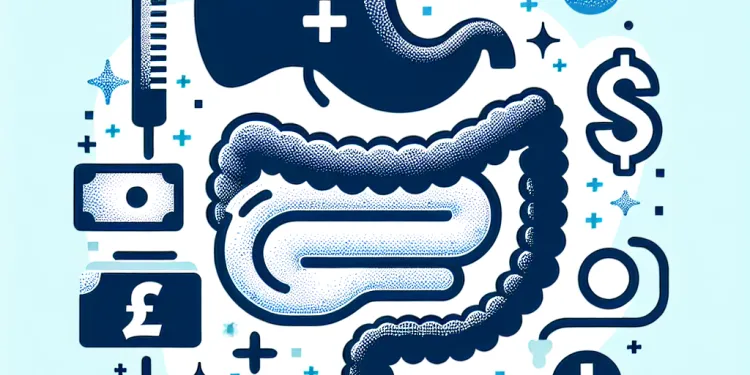
What are the potential complications of appendicitis?
Relevance: 32%
-
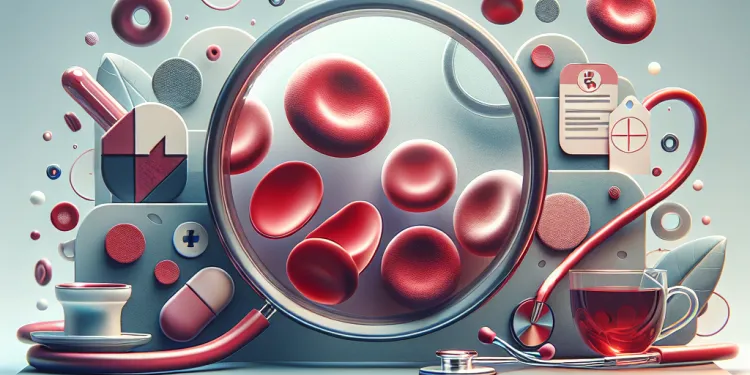
What is sickle cell disease?
Relevance: 31%
-

Introduction to Sickle cell disease
Relevance: 31%
-

Can meningitis cause long-term complications?
Relevance: 30%
-

Can Lyme disease be treated?
Relevance: 30%
-

Can flesh-eating disease be treated?
Relevance: 29%
-

What is a flesh-eating disease?
Relevance: 29%
-
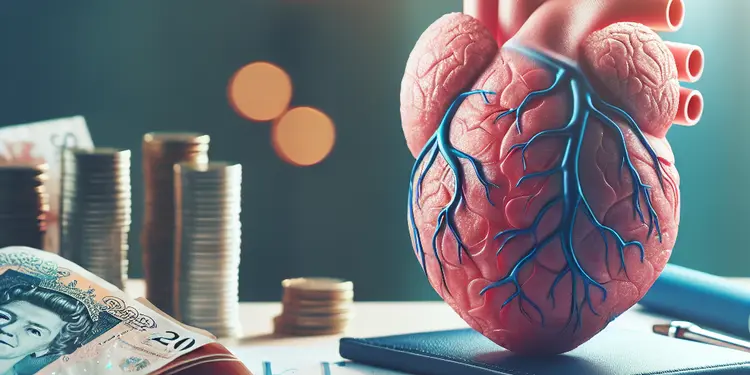
Are there any complications associated with untreated BPH?
Relevance: 29%
-

What are the symptoms of Marburg virus disease?
Relevance: 29%
-

What is a flesh eating disease?
Relevance: 29%
-

What are potential complications of nettle rash?
Relevance: 29%
-

Coeliac Disease: Session 1: What is Coeliac Disease?
Relevance: 29%
Understanding Complications Associated with Crohn's Disease
Crohn's disease, a type of inflammatory bowel disease (IBD), can lead to several complications if not managed effectively. These complications can affect various parts of the body, leading to significant health challenges for patients in the United Kingdom and globally.
Intestinal Complications
One of the primary complications of Crohn's disease is related to the intestines. Strictures, which are a narrowing of the intestine due to inflammation and scar tissue, can lead to bowel obstructions. This can cause severe pain, vomiting, and abdominal distension. Fistulas, or abnormal connections between different parts of the intestines or between the intestines and other organs, are also common. These require surgical intervention and can severely affect a person's quality of life if not treated.
Nutritional Deficiencies
Crohn's disease often interferes with nutrient absorption, leading to deficiencies. Patients can become deficient in essential vitamins and minerals, such as Vitamin B12, iron, vitamin D, and calcium. This can result in symptoms like fatigue, anemia, osteoporosis, and other related conditions. Providing adequate nutritional support is a crucial component of managing Crohn's disease effectively.
Increased Risk of Colorectal Cancer
Individuals with long-standing Crohn's disease, particularly those with disease affecting the colon, have an increased risk of developing colorectal cancer. Regular screening and monitoring are necessary to detect any precancerous changes early and manage them appropriately.
Extra-intestinal Manifestations
Beyond the digestive tract, Crohn's disease can affect other parts of the body, leading to what are known as extra-intestinal manifestations. These can include arthritis, skin conditions such as erythema nodosum, ocular inflammation, and liver disorders like primary sclerosing cholangitis. These manifestations require coordinated care across different medical specialties.
Impact on Mental Health
Chronic diseases like Crohn's can significantly impact a patient's mental health. Anxiety and depression rates are higher among individuals with Crohn's disease due to the chronic pain, lifestyle alterations, and social changes associated with the condition. Mental health support and counseling are vital parts of a comprehensive care plan.
In conclusion, Crohn's disease carries the potential for multiple serious complications that can extend beyond the gastrointestinal tract. Patients in the UK must receive a comprehensive, multidisciplinary approach to manage these risks effectively, involving regular monitoring and tailored treatments to improve their quality of life.
Understanding Problems with Crohn's Disease
Crohn's disease is a health problem that affects the tummy. If Crohn's disease is not cared for, it can cause more problems in the body. This can make people feel very unwell in the UK and around the world.
Tummy Problems
Crohn's disease can cause problems in the tummy. One problem is called strictures, where the tummy pipes get too narrow because of swelling. This can block food from moving through and cause a lot of pain and sickness. Crohn's can also cause fistulas, which are strange openings that should not be there. Fistulas need an operation and can make life hard if not fixed.
Not Enough Nutrients
People with Crohn's disease may not get enough important nutrients from their food. This can make them tired and cause problems like weak bones or low iron. People with Crohn's need extra help with their food to stay healthy.
Higher Chance of Bowel Cancer
Having Crohn's disease for a long time, especially in the large tummy pipe (colon), can make it more likely to get bowel cancer. It is important to check for early signs of cancer regularly.
Problems Outside the Tummy
Crohn's disease can also cause problems in other parts of the body. It can make the joints hurt (arthritis), cause skin problems, eye irritation, and liver problems. Doctors from different areas often work together to give the best care.
Feeling Sad or Worried
Living with Crohn's disease can make people feel sad or worried. This is because of the pain, changes in daily life, and social life. Support from mental health professionals and talking therapy is important to feel better.
In summary, Crohn's disease can cause many serious problems inside and outside the tummy. People in the UK need special care and regular check-ups to stay well. A plan with different treatments can help improve life for people with Crohn's disease.
Frequently Asked Questions
What are the common complications associated with Crohn's disease?
Crohn's disease can lead to several complications, including stricture (narrowing of the intestine), fistulas (abnormal connections between organs), and abscesses (pockets of infection).
Can Crohn's disease affect other parts of the body besides the digestive tract?
Yes, Crohn's disease can cause inflammation in other parts of the body, such as the skin, eyes, and joints.
Are people with Crohn's disease at higher risk for colon cancer?
Yes, individuals with Crohn's disease have an increased risk of developing colon cancer, particularly if the disease affects the colon extensively.
How does Crohn's disease lead to malnutrition?
Crohn's disease can interfere with digestion and absorption of nutrients, leading to deficiencies and malnutrition. The inflammation and ulcerations in the digestive tract can disturb nutrient uptake.
What are strictures in the context of Crohn's disease?
Strictures are narrowings of the intestine due to chronic inflammation and scar tissue that can block the passage of food.
How common are fistulas in Crohn's disease?
Fistulas occur in up to 30% of people with Crohn's disease and are more common in those with disease located in the perianal area.
Can Crohn's disease lead to complications in children?
Yes, Crohn's disease can cause growth retardation and delayed puberty in children due to malnutrition and inflammation.
Is there a connection between Crohn's disease and osteoporosis?
People with Crohn's disease are at increased risk of osteoporosis due to inflammation, malabsorption of calcium, and sometimes the use of corticosteroid medications.
Can Crohn's disease cause kidney stones?
Yes, Crohn's disease can lead to the formation of kidney stones, particularly oxalate stones, due to changes in the absorption of dietary substances.
What is the impact of Crohn's disease on mental health?
Crohn's disease can have a significant psychological impact, potentially leading to anxiety and depression due to chronic pain and lifestyle limitations.
Does Crohn's disease affect fertility?
In general, Crohn's disease does not significantly affect fertility, but active disease and certain surgeries may impact reproductive health.
Are infections a complication of Crohn's disease treatment?
Yes, some treatments for Crohn's disease, such as immunosuppressive medications, can increase the risk of infections.
Do people with Crohn's disease experience bowel obstructions?
Yes, bowel obstructions can occur due to strictures and inflammation, requiring medical intervention.
Can Crohn's disease cause fatigue?
Chronic fatigue is a common symptom of Crohn's disease, often due to pain, malnutrition, or the side effects of medications.
What surgical complications can arise from Crohn's disease?
Potential surgical complications include risks associated with anesthesia, infection, and bowel obstruction post-surgery.
What problems can happen with Crohn's disease?
Crohn's disease can cause some problems. These problems are called "complications." Here are some common ones:
- Belly pain: You might feel sore or hurt in your tummy.
- Diarrhea: You might need to use the toilet a lot.
- Weight loss: You might lose weight without trying.
- Low energy: You might feel very tired.
- Fever: You might feel hot and have a high temperature.
If you have Crohn's disease, it's important to talk to a doctor if you feel any of these problems. A doctor can help you feel better.
Using a calendar to track when you feel unwell and remembering to ask someone if you don't understand something can help manage Crohn's disease.
Crohn's disease can cause problems. These include:
- **Stricture:** This is when the intestine becomes narrow.
- **Fistulas:** These are strange connections between body parts.
- **Abscesses:** These are spots filled with infection.
If you need more help, you can talk to a doctor or use pictures and videos to understand better.
Can Crohn's Disease Hurt Other Parts of the Body?
Crohn's disease is a condition that can make your tummy hurt. But it can also cause problems in other parts of your body.
Here are some ways Crohn's disease might hurt other parts:
- It can make your joints feel sore.
- It might cause your eyes to hurt or get red.
- You could get rashes on your skin.
To help you understand better:
- You can ask a grown-up or doctor to explain more.
- Using pictures or videos can make it easier.
- Writing down notes can help you remember.
Yes, Crohn's disease can make other parts of the body sore. It can make your skin, eyes, and joints hurt.
Do people with Crohn's disease have a higher chance of getting colon cancer?
People with Crohn's disease may have a higher chance of getting colon cancer. It is important for them to talk to their doctor about regular check-ups.
Here are some tips to help:
- Ask questions during doctor visits.
- Keep a record of what the doctor says.
- Use a calendar to remember check-up dates.
People who have Crohn's disease are more likely to get colon cancer. This is especially true if Crohn's disease affects a big part of their colon.
Why do people with Crohn's disease not get enough nutrients?
Crohn's disease is when the tummy and gut are not healthy. This makes it hard for the body to take in all the good stuff from food. Here is how this happens: 1. **Tummy Pain and Upset**: Crohn's disease can hurt your tummy. This can make you not want to eat because it feels bad. 2. **Body Can't Use Food Well**: When your gut is inflamed, your body may not take in vitamins and minerals from the food you eat. 3. **Diarrhea**: If you have diarrhea a lot, you lose water and nutrients. This can make you weak. 4. **Foods You Can't Eat**: Some foods might make Crohn's disease worse. You might have to avoid these foods, which could mean you're missing out on important nutrients. To help stay healthy, you can: - **Eat Small Meals**: Try eating smaller meals more often to help your tummy. - **Drink Lots of Water**: Stay hydrated by drinking plenty of water. - **Talk to a Doctor**: A doctor can help you find foods that are safe for you to eat. - **Use Supplements**: Sometimes, special vitamins can help if you're not getting enough from food. Always ask a doctor before trying new foods or vitamins.Crohn's disease can make it hard for your body to get the food and vitamins it needs. This happens because Crohn's causes sore spots and swelling in your belly, which stops your body from taking in the good stuff from food.
Here are some things that can help:
- Eat small meals often instead of big ones.
- Try to eat foods that are soft and gentle on the belly.
- Talk to a doctor or dietitian who can help with a helpful eating plan.
- You might take vitamins and supplements if needed.
What are strictures in Crohn's disease?
Crohn's disease is a sickness that can make your tummy hurt. It makes parts of the gut swollen. A stricture is a tight spot in the gut. This can make it hard for food to move through. It can feel painful.
Some tools and tips can help you understand better:
- Use pictures to see how the gut works.
- Ask a doctor or nurse to explain with simple words.
- Watch videos about Crohn's disease.
Strictures are tight spots in the intestines. These happen when there is long-time swelling and scar tissue. This can make it hard for food to go through.
How often do fistulas happen in Crohn's disease?
About 30 out of every 100 people with Crohn's disease can get fistulas. Fistulas happen more often if the Crohn's disease is near the bottom, called the perianal area.
Can children have problems because of Crohn's disease?
Crohn's disease can cause problems for children. Here are some ways it can affect them:
- Children might not grow as tall as they should.
- They might not gain enough weight.
- They could have tummy aches often.
- They might feel very tired or weak.
If you think a child has Crohn's, talk to a doctor. They can help find ways to make the child feel better.
Some ways to help are:
- Eating healthy foods.
- Taking medicine from the doctor.
- Going to the doctor for check-ups.
There are tools that can help, like pictures or videos, to learn more about Crohn's. Always ask for help if you need it.
Yes, Crohn's disease can make children grow slower and start puberty later. This is because the body might not get enough nutrients and there might be swelling inside.
Does Crohn's Disease Cause Weak Bones?
People with Crohn's disease might have weak bones. Weak bones are called osteoporosis. It means bones can break easily.
If you have Crohn's disease, ask your doctor about your bones. They can help you keep your bones strong.
Using a soft cushion or pillow can help support your body. Eating healthy foods like milk, cheese, and broccoli is good for bones.
Try to get a little sun every day. It helps your body get Vitamin D. Vitamin D is important for bones.
People with Crohn's disease can have weaker bones. This happens because:
- There is swelling inside their bodies.
- They might not get enough calcium.
- They sometimes take medicine that can weaken bones.
Using tools like plain language and pictures can help people understand better. It's also good to ask doctors questions if something is confusing.
Can Crohn's disease cause kidney stones?
Crohn's disease is when your stomach and gut are not well. It can sometimes make kidney stones. Kidney stones are little hard things that hurt inside your body.
If you have Crohn's disease, talk to your doctor. Your doctor can help stop kidney stones. Drink lots of water. Eat healthy food. Ask a friend or family to help you understand.
Yes, Crohn's disease can cause kidney stones. These stones happen because the body changes how it uses some foods. The most common stones are called oxalate stones.
How does Crohn's disease affect how we feel?
Crohn's disease is an illness that can make your tummy hurt. It can also make you feel tired. Sometimes, having this illness can make you feel sad or worried. It's important to talk about your feelings.
Here are some ways to feel better:
- Talk to someone you trust, like a family member or friend.
- Tell a doctor or nurse how you feel.
- Try doing things that make you happy, like drawing or playing.
Having Crohn's disease can make you feel very sad or worried. This is because it can hurt a lot and stop you from doing things you like.
Can Crohn's disease make it hard to have babies?
Usually, Crohn's disease does not make it harder to have a baby. But if the disease is active or if you have had certain surgeries, it might change how your body makes babies.
Can Crohn's disease treatment cause infections?
Crohn's disease is an illness that affects the tummy. The medicines used to treat it can sometimes make it easier to get infections. This is because some medicines lower the body's defenses, called the immune system.
If you are taking these medicines, doctors will watch you carefully. They make sure you stay healthy and treat any infections quickly.
If you feel sick while on treatment, it's important to tell a doctor. They can help you feel better.
Tools like reminder apps and pill organizers can help you take your medicine on time and not forget any doses. Talking with a support group can also help, as they can share their experiences and tips.
Yes, some medicines for Crohn's disease can make it easier to get sick. These medicines help the body by calming it down, but they can also make you catch infections more easily.
Do people with Crohn's disease have problems with their bowels getting blocked?
Yes, sometimes the bowel can get blocked because it gets too tight or swollen. When this happens, a doctor needs to help fix it.
Can Crohn's disease make you feel very tired?
Crohn's disease is an illness where your tummy (stomach) gets sore and swollen.
People with Crohn's disease often feel very tired. This is called fatigue.
Here are some tips to help feel less tired:
- Rest when you need to.
- Eat healthy foods.
- Drink plenty of water.
- Ask a doctor for advice.
Using pictures or apps can also help understand and remember this information.
Feeling very tired is common if you have Crohn's disease. This can happen because of pain, not eating enough healthy food, or from taking medicine.
What problems can happen after surgery for Crohn's disease?
Crohn's disease is a sickness that affects the tummy and intestines. Sometimes, people need surgery to help them feel better. After surgery, some problems can occur. These problems are:
- Extra bleeding: Sometimes, there can be too much bleeding after the surgery.
- Infection: A place where the surgery happened might get dirty and cause an infection.
- Scar tissue: When the body heals, it might make tough tissue called scars. These can cause blockages.
- Leaks: The new connections inside your body can sometimes leak.
To help people understand, it is good to:
- Use pictures or drawings to show what might happen.
- Talk to a doctor who can explain things simply.
- Ask questions and take notes to remember important information.
When you have surgery, some things might go wrong. These are called complications. Here are some of them:
- Anesthesia risks: This is when the medicine that helps you sleep during surgery could cause problems.
- Infection: This means germs could cause your body to get sick after the surgery.
- Bowel obstruction: This is when your tummy might not work properly and could be blocked after surgery.
If you have trouble reading, you can ask someone to read this to you. You can also use tools like text-to-speech to help understand better.
Useful Links
This website offers general information and is not a substitute for professional advice.
Always seek guidance from qualified professionals.
If you have any medical concerns or need urgent help, contact a healthcare professional or emergency services immediately.
Some of this content was generated with AI assistance. We’ve done our best to keep it accurate, helpful, and human-friendly.
- Ergsy carfully checks the information in the videos we provide here.
- Videos shown by Youtube after a video has completed, have NOT been reviewed by ERGSY.
- To view, click the arrow in centre of video.
- Most of the videos you find here will have subtitles and/or closed captions available.
- You may need to turn these on, and choose your preferred language.
- Go to the video you'd like to watch.
- If closed captions (CC) are available, settings will be visible on the bottom right of the video player.
- To turn on Captions, click settings .
- To turn off Captions, click settings again.
More Items From Ergsy search
-

Are there any complications associated with Crohn's disease?
Relevance: 100%
-

Is there a cure for Crohn's disease?
Relevance: 80%
-

Is surgery necessary for Crohn's disease?
Relevance: 78%
-

What causes Crohn's disease?
Relevance: 77%
-

Is Crohn's disease contagious?
Relevance: 77%
-

How is Crohn's disease diagnosed?
Relevance: 76%
-

What treatments are available for Crohn's disease?
Relevance: 75%
-

What is Crohn’s disease and how is it treated?
Relevance: 75%
-

Who is at risk of developing Crohn's disease?
Relevance: 74%
-

What are the common symptoms of Crohn's disease?
Relevance: 74%
-

How does smoking affect Crohn's disease?
Relevance: 72%
-

Can children develop Crohn's disease?
Relevance: 71%
-

What support is available for people with Crohn's disease in the UK?
Relevance: 70%
-

What is the best diet for Crohn’s disease?
Relevance: 70%
-

Can stress make Crohn's disease worse?
Relevance: 68%
-

What dietary changes can help manage Crohn's disease?
Relevance: 63%
-

Infliximab infusion (Remicade) for Crohns Disease at Addenbrookes NHS hospital
Relevance: 57%
-

What are the complications of sickle cell disease?
Relevance: 51%
-

Can flesh-eating disease cause long-term complications?
Relevance: 49%
-

What are the complications of chickenpox?
Relevance: 38%
-

What complications are associated with Type 2 Diabetes?
Relevance: 35%
-

Can measles cause complications?
Relevance: 35%
-

Who is most at risk for complications from H3N2?
Relevance: 34%
-

Can scabies cause complications?
Relevance: 34%
-

Are there any complications associated with shingles?
Relevance: 33%
-

What complications can arise from measles?
Relevance: 33%
-

Are there any complications associated with shingles?
Relevance: 33%
-

Can Nipah Virus cause neurological complications?
Relevance: 33%
-

What are the potential complications of appendicitis?
Relevance: 32%
-

What is sickle cell disease?
Relevance: 31%
-

Introduction to Sickle cell disease
Relevance: 31%
-

Can meningitis cause long-term complications?
Relevance: 30%
-

Can Lyme disease be treated?
Relevance: 30%
-

Can flesh-eating disease be treated?
Relevance: 29%
-

What is a flesh-eating disease?
Relevance: 29%
-

Are there any complications associated with untreated BPH?
Relevance: 29%
-

What are the symptoms of Marburg virus disease?
Relevance: 29%
-

What is a flesh eating disease?
Relevance: 29%
-

What are potential complications of nettle rash?
Relevance: 29%
-

Coeliac Disease: Session 1: What is Coeliac Disease?
Relevance: 29%


